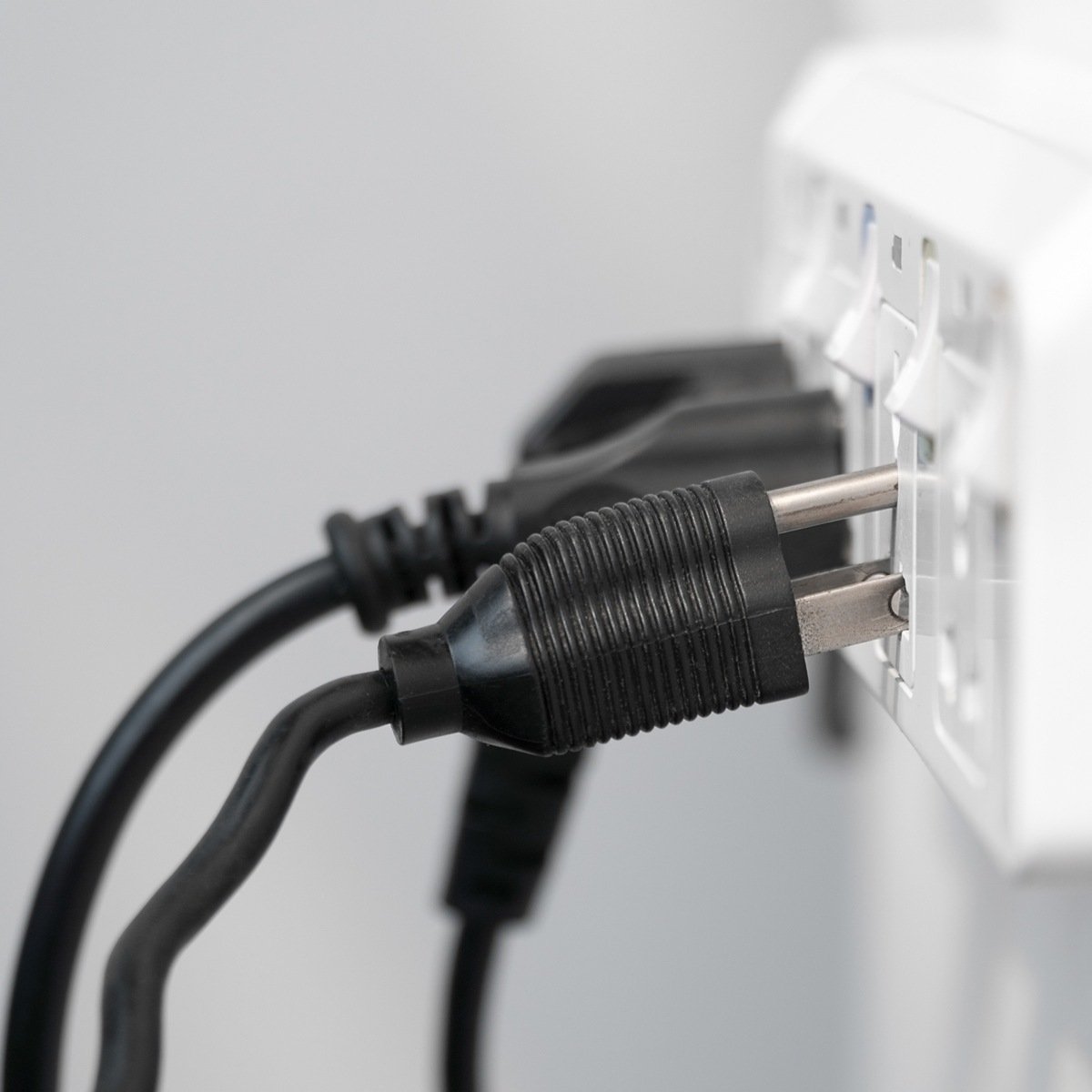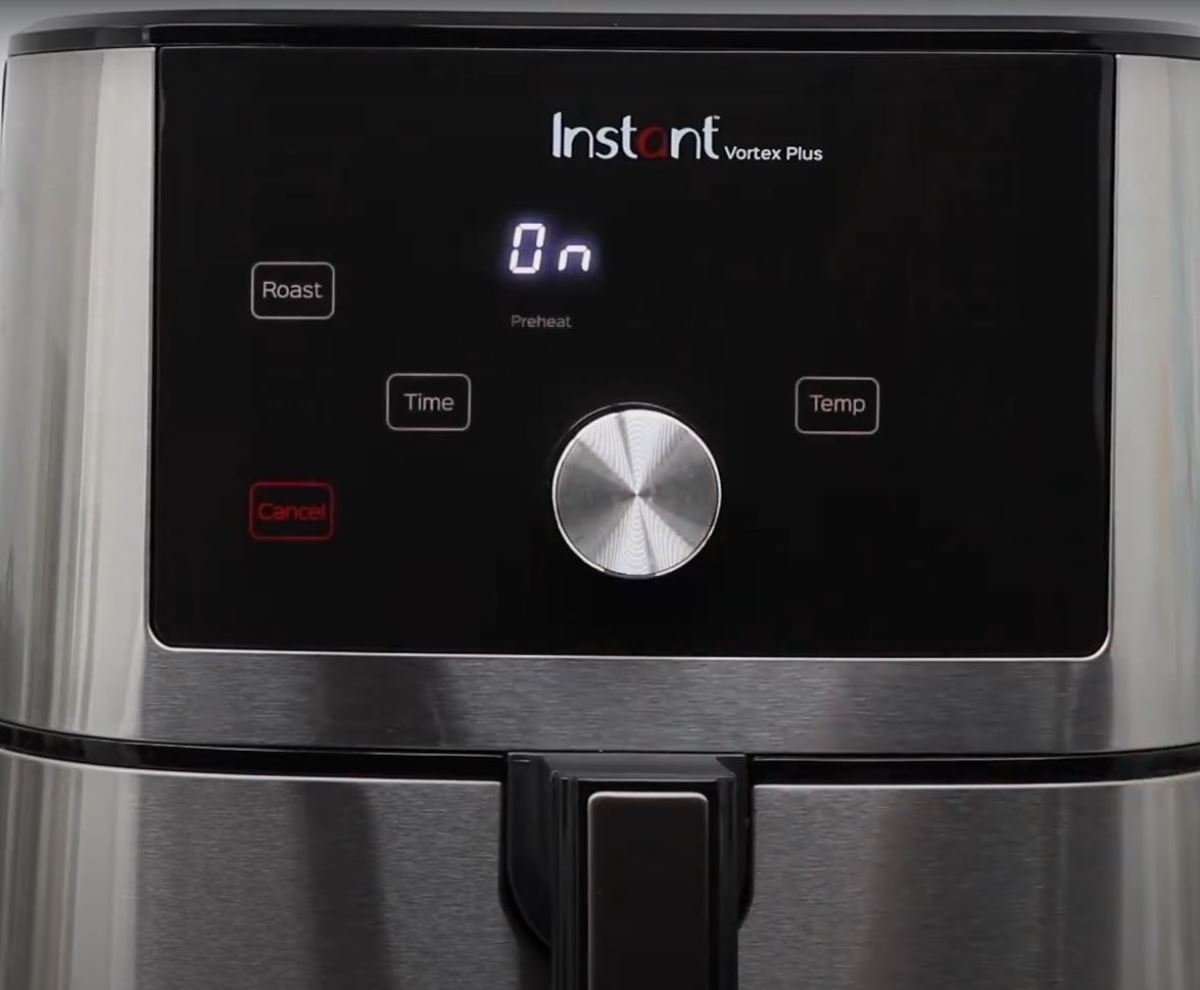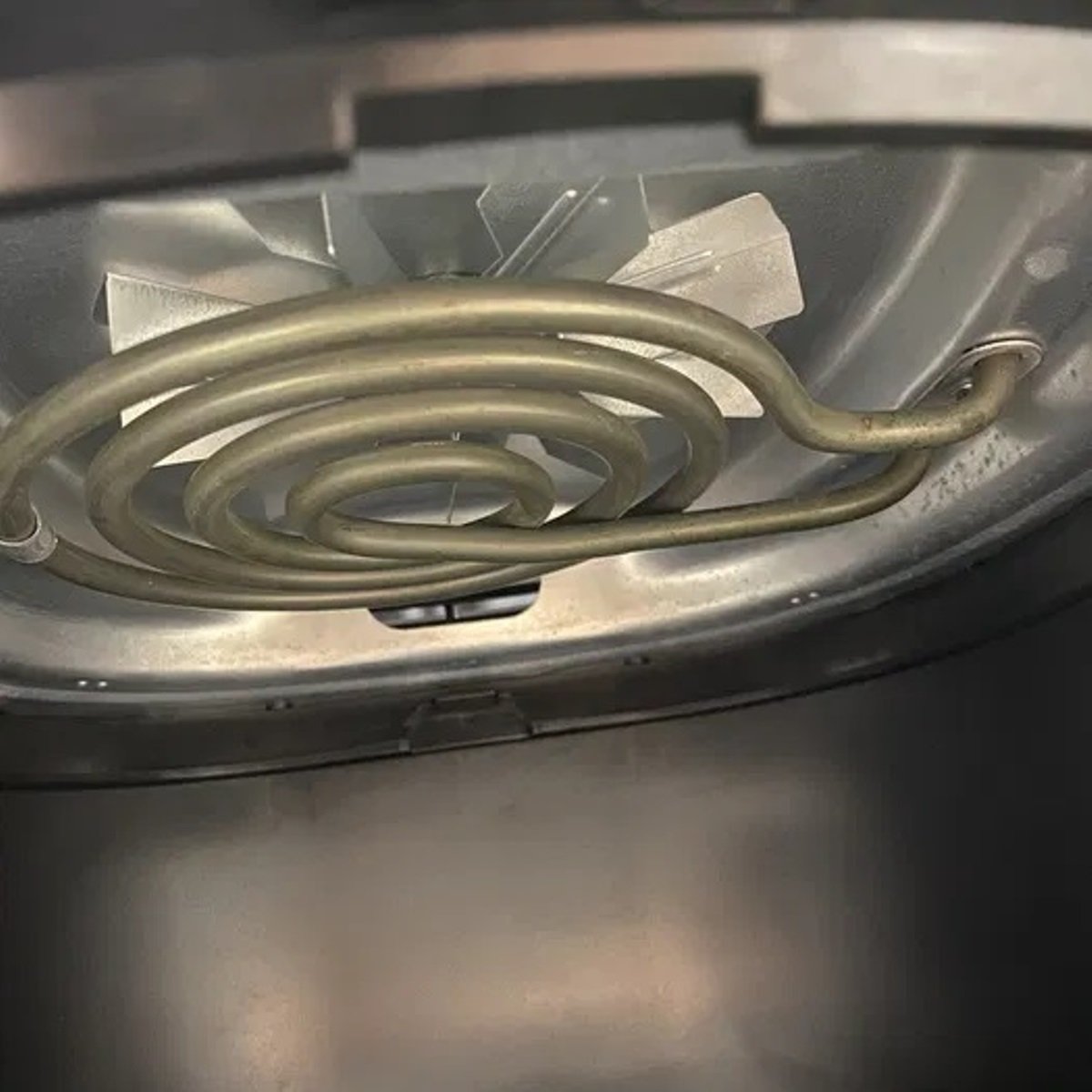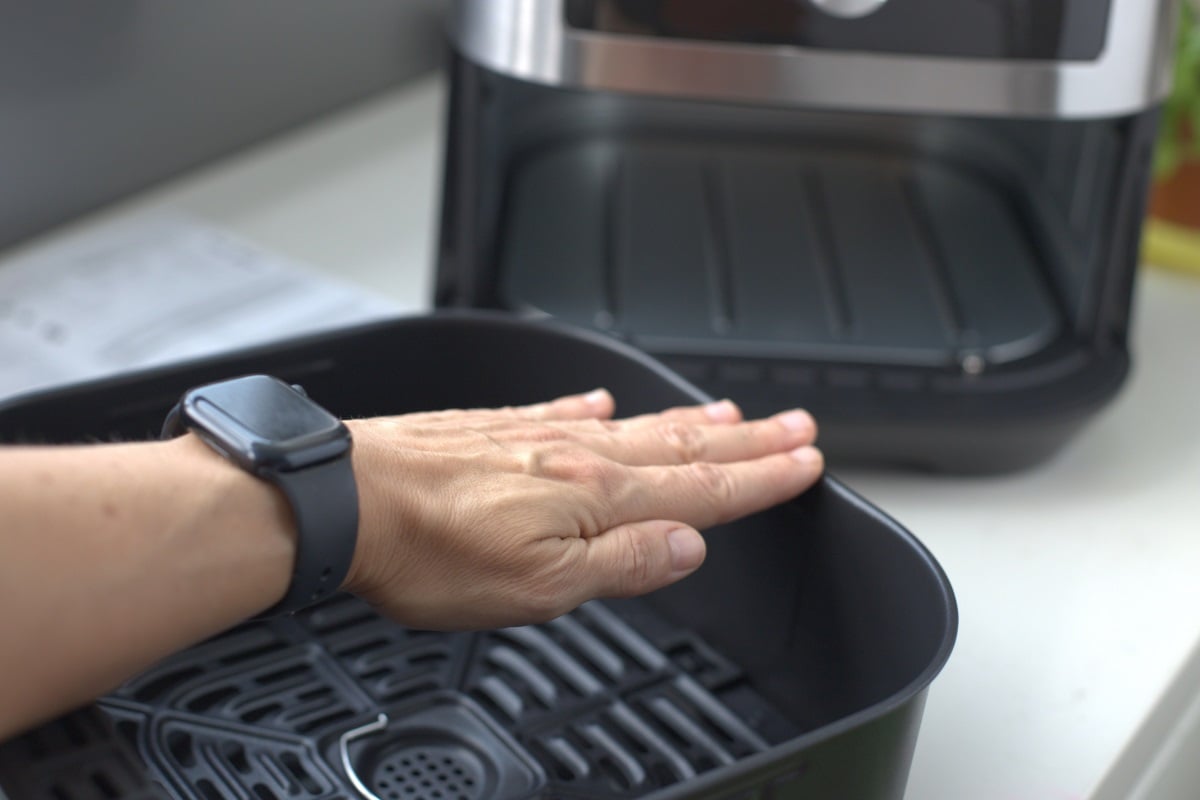
Have you excitedly unpacked your new air fryer, envisioned crispy deliciousness, but then – utter disappointment? You hit start, and the timer ticks away, yet your food remains disappointingly cold. You are likely thinking, “Why is my air fryer not heating up“?
I’ve all been there, standing bewildered in the kitchen with a rumbling stomach and a cold air fryer. But worry no more. This isn’t the end of your air-frying dreams. In this post, you’ll learn about possible causes for why this is happening along with easy DIY fixes! Let’s begin!
Jump to:
Common Reasons Your Air Fryer Might Not Be Heating
Before you toss your air fryer out the window in frustration, let’s investigate some common culprits behind this all too familiar conundrum.
1. Power Supply Issues: The Usual Suspects
This may seem obvious, but it’s always worth double-checking to make sure that the air fryer is getting power. It really is as simple as making sure the plug is completely and securely pushed into a working outlet. To test if your outlet is faulty, try plugging in a different appliance like a lamp.
If it still doesn’t work, plug in the air fryer to another outlet to ensure that a faulty outlet is not causing the problem. It’s easy to overlook a tripped circuit breaker, so if your air fryer still isn’t getting any juice, locate your circuit breaker box and identify if any switches are out of alignment.
You can reset it by switching it off and then back on. And last, make sure to inspect the air fryer’s power cord. Although this is less common, sometimes the cord itself might be damaged preventing it from receiving power.
A damaged power cord can affect the air fryer heat, causing it not to heat up properly. You can use a multimeter to test for continuity if you suspect a fault with your power cord.
Note: One common issue could be a blown fuse in the air fryer, so it’s important to check it internally.
2. Temperature Settings: Are You Speaking its Language?

Air fryers have their own little personalities, and sometimes that means being a bit finicky. Double-check that the timing is accurate and the temperature is set correctly for what you’re cooking.
If the air fryer's timer is broken, it can lead to potential food mishaps, such as overcooked or undercooked meals. Address this issue by replacing the broken timer with the assistance of a professional technician.
Also, confirm the timer isn’t accidentally set to zero or a very short duration as this will cause your air fryer to shut off before it’s actually had time to heat up. For example, if you are cooking chicken and only set the timer for five minutes, it won’t have nearly enough time to heat up to the proper temperature.
3. Overheating Protection: A Safety Feature, Not a Cooking Foe
Believe it or not, air fryers can be a little too enthusiastic about their job. They are designed with an internal thermostat and a safety feature that kicks in to prevent the appliance from getting dangerously hot, kind of like an automatic time-out to cool down. However, this can backfire if it’s triggered unnecessarily.
There are a few things that might be setting off this protective instinct. First, make sure you are using your air fryer on a flat and stable surface, as this can disrupt airflow and cause the air fryer to overheat. An unstable surface disrupts airflow.
And while you are checking for balance, be sure to close the lid before starting. Also, look for anything that might be obstructing the air vents, and make sure there's enough space around the air fryer. If the appliance overheats often, give it a rest between uses.
Related: Where to Place Air Fryer in Kitchen: Do's And Dont's
4. Cleanliness: A Clean Fryer is a Happy Fryer (And a Working One.)

When was the last time you treated your air fryer to a little spa day? It might sound silly, but air fryers not heating up is a common issue that can stem from built-up food and grease.
If the heating element, which is what makes the hot air, is covered in gunk, it can’t do its job properly. The air vents, responsible for circulating hot air throughout the appliance also become less effective.
To show your appliance some love (and improve its performance) clean the basket, tray, and other removable parts with warm soapy water after each use. You'll thank yourself later.
5. Malfunctioning Components: It Might Be Time for a Check-Up
Sometimes, despite your best efforts, the problem runs deeper. If you’ve diligently ruled out the common culprits above and still find yourself staring at a stubbornly cold air fryer, there might be an issue with one or more of its internal components.
The heating element is crucial as it heats the air. For the Power XL air fryer, troubleshooting heating issues may involve checking built-in safety features, and power supply problems, and adjusting settings to ensure proper functionality.
If the heating element malfunctions, the air fryer will fail to produce the hot air essential for the cooking process. Consider if your air fryer has stopped working and troubleshoot why it might not be heating. Call the manufacturer’s customer support; they are there to provide additional assistance in times of need.
6. Ventilation Issues
Proper ventilation is crucial for an air fryer to function correctly. If the vents are blocked or clogged with food debris or grease, it can affect the airflow and prevent the air fryer from heating properly.
Regularly cleaning your air fryer, including the vents and fans, can help maintain its performance. Ensure that the air fryer is placed on a flat, stable surface with enough space around it for proper ventilation.
7. User Error
Sometimes, the issue might not be with the air fryer itself but with how it's being used. Double-check the user manual to ensure you're operating the air fryer correctly.
Make sure you're setting the right temperature and timer, and that the air fryer basket is properly inserted. It's also worth noting that overloading the air fryer basket can prevent it from heating evenly, so try cooking smaller batches to see if that resolves the issue.
Also Read: What Does C7 Mean on Instant Pot? Here's How to Fix It
8. Manufacturing Defects
If your air fryer is relatively new and none of the above solutions work, it might be worth considering the possibility of a manufacturing defect. In such cases, contact the manufacturer or retailer. Many air fryers come with a warranty, and you may be able to get a replacement or have it repaired at no cost.
Related: Air Fryer Recall: Is Your Kitchen Appliance at Risk?
9. Environmental Factors
Believe it or not, the environment where you use your air fryer can impact its performance. If you're using the air fryer in an extremely cold or hot environment, it might struggle to maintain the correct temperature. Try to use your air fryer in a stable, room-temperature environment to ensure optimal performance.
Also see: 8 Worst Foods to Cook in Air Fryer
Troubleshooting Beyond the Basics

If you are feeling tech-savvy, you can try some advanced troubleshooting. If not, you might want to reach out to a qualified technician or the manufacturer.
When troubleshooting an air fryer that is not heating up, it's essential to go beyond basic checks to identify and address potential issues. Here are detailed steps and considerations to help diagnose and resolve the problem:
Inspect Heating Elements:
Issue: Heating elements can wear out or become damaged over time, affecting their ability to generate heat.
Solution: Carefully inspect the heating elements for any signs of damage, such as burns or breaks. If damaged, they may need to be replaced according to manufacturer instructions.
Verify Power Supply:
Issue: A faulty power supply, including a damaged cord or outlet, can prevent the air fryer from receiving adequate power to heat up.
Solution: Check the power cord for any visible damage or fraying. Ensure the air fryer is plugged securely into a working outlet. Consider testing the outlet with another appliance to confirm it's functioning properly.
Check Timer and Temperature Settings:
Issue: Incorrect timer settings or temperature settings that don't match the cooking requirements can lead to inadequate heating.
Solution: Double-check the timer settings to ensure they are correctly set for the desired cooking time. Verify that the temperature setting aligns with the recipe or food being prepared. Adjust as needed based on the air fryer's capabilities.
Also read: When And How To Use The Roast Setting On An Air Fryer
Clean Air Vents:
Issue: Blocked air vents can restrict airflow, which is crucial for distributing heat evenly throughout the air fryer.
Solution: Inspect the air vents for any obstructions, such as food particles or grease buildup. Use a soft brush or cloth to gently clean the vents and ensure unrestricted airflow during operation.
Reset or Replace Thermostat:
Issue: A malfunctioning thermostat may fail to regulate the air fryer's temperature correctly, resulting in inconsistent heating or no heating at all.
Solution: Some air fryers have a reset button for the thermostat. Refer to the user manual to locate and press this button if necessary. If resetting doesn't resolve the issue, consider contacting customer support for guidance on thermostat replacement.
Inspect Pan Detection Switch:
Issue: The pan detection switch ensures the air fryer only operates when the cooking basket is properly inserted. A faulty switch can prevent the heating process from initiating.
Solution: Check that the cooking basket is correctly placed into the air fryer. Ensure the pan detection switch is not obstructed and makes firm contact with the basket. Clean or adjust the switch as needed.
Test Outlet and Circuit:
Issue: Issues with the electrical outlet or circuit can prevent the air fryer from receiving sufficient power to heat up.
Solution: Plug the air fryer into a different outlet or circuit to determine if the original outlet is causing the problem. Avoid using extension cords or surge protectors, as these can also affect power supply to the appliance.
Check for Faulty Wiring:
Issue: Loose or damaged wiring within the air fryer can disrupt the heating process and pose safety risks.
Solution: Carefully inspect the internal wiring of the air fryer for any signs of damage or disconnection. If you're not comfortable with this task, seek assistance from a qualified technician or get hold of customer support for advice.
Clean and Maintain Regularly:
Issue: Accumulated food residues, grease, or debris can impact the air fryer's performance over time.
Solution: Regularly clean the air fryer according to the manufacturer's instructions. Pay attention to cleaning the cooking basket, heating elements, and any removable parts. Proper maintenance helps prevent buildup that can hinder heating efficiency.
Consult Manufacturer's Guide:
Issue: Each air fryer model may have specific troubleshooting steps recommended by the manufacturer.
Solution: Refer to the user manual or online resources provided by the manufacturer. Follow their guidance for troubleshooting and maintenance to address heating issues effectively.
Avoid Overcrowding:
Issue: Overfilling the air fryer basket can block airflow and lead to uneven cooking or insufficient heating.
Solution: Cook food in batches if necessary to ensure adequate space for airflow within the air fryer. Avoid overcrowding to allow for efficient heat distribution and cooking performance.
Also read: Are Air Fryers Allowed in Dorms? Dorm Cooking At Its Best!
Professional Inspection:
Issue: If troubleshooting steps do not resolve the heating problem, there may be underlying issues like a broken heating element or thermostat that require professional diagnosis and repair.
Solution: Correspond with the manufacturer's customer support or a certified technician for further assistance. Describe the issue in detail and follow their recommendations for servicing or replacing components as needed.
By following these detailed troubleshooting steps, you can effectively diagnose why your air fryer is not heating up and take appropriate actions to restore its functionality for optimal cooking performance.
Troubleshooting electronic appliances should be done cautiously and ideally by someone qualified. However, checking for things such as a broken temperature switch or loose connections is often possible if done with care. Remember safety always comes first!
Related: Why Does My Air Fryer Keep Turning Off? Top Troubleshooting Tips
FAQs
An air fryer blowing cold air generally points to the heating element not working as it should. This could be due to a faulty heating element, issues with the control board not sending power, a broken temperature sensor, or a malfunctioning fan.
Unless you're well-versed in electronics, it’s wise to get your appliance checked out by someone who knows what to look for.
The pan detection switch ensures proper contact for heating. Make sure the pan is correctly inserted and not blocking air vents.
Allow the air fryer to cool down, then check for loose wires or debris that might be blocking proper heating.
Uneven heating could be due to internal air fryer heating issues or improper temperature settings. Follow the manufacturer's instructions for optimal performance.
The thermostat regulates internal temperature. Issues with the thermostat can lead to inconsistent heating.
Conclusion
So, you were all set to whip up a crispy culinary masterpiece but opened your air fryer to discover…a less-than-appetizing outcome. Figuring out why an air fryer is not heating up often feels like playing detective in the kitchen. But now that you are equipped with our guide, you can rule out those basic issues and have delicious air-fried meals in no time!










Leave a Reply